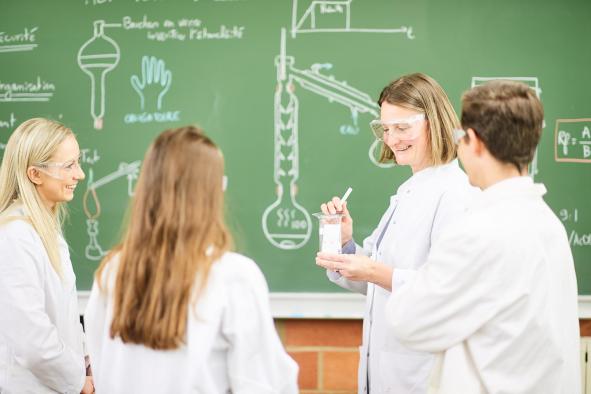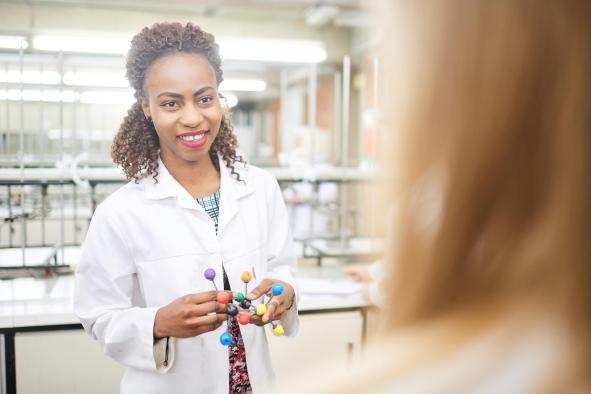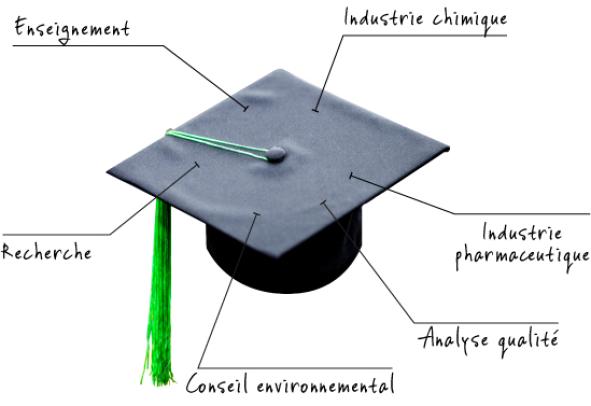Bachelor in Chemistry
-
Schedule
regular course
- ECTS Credits 180

Chemistry touches on all areas of science. It is necessary to understand matter, its properties, transformations and applications, in close connection with the other disciplines with which it interacts. Your bachelor therefore starts with a general approach to chemistry, but also to other scientific subjects such as physics, mathematics, biology and geology.
You will then delve deeper into the various fields of chemistry: organic chemistry, macromolecular chemistry, inorganic chemistry, analytical chemistry, biological chemistry, physical chemistry, quantum chemistry, crystallography, spectroscopy...
As well as scientific training, the bachelor's degree also enables you to acquire a command of certain computer tools and English, the language of communication between researchers.
A human dimension completes your training. Reflective courses on scientific methodologies and their limits, psychology and the scientist's responsibility to the environment.
You're off to a good start
- you have a great curiosity and openness with regard to scientific problems;
- you feel at ease in mathematics and science without having followed a strong program in high school;
- you demonstrate rigor and precision;
- you have the spirit of synthesis.
Teaching methods

Courses, seminars, laboratories, practical work, personal work and exercise sessions are all designed to help you master the concepts.
Organized in small groups, practical work, personal work and exercise sessions introduce you to the techniques specific to each discipline. You'll learn how to use equipment, take measurements, interpret and present them. In this way, you observe, experimentally, certain laws or phenomena exposed in the theoretical lessons.
Autonomy and initiative are required throughout your training. What's more, you conclude your bachelor's degree with the self-study completion of a personal end-of-cycle assignment based on your practical chemistry work.
Success aids
Succeeding in a year of study at university involves many challenges.
To help you meet them, we support you in developing your disciplinary, methodological and human skills... with the support of numerous professionals.
Preparatory courses, individualized help... Discover the schemes set up for your training.
After the baccalauréat: the master's degree
The University of Namur organizes
- the master 120 in chemical sciences
- the master 60 in chemical sciences
- the master 60 in chemistry
- the master in chemistry education
- 120 credits - section 4 (from 2025)
- 60 credits - section 5 (from 2025)
-
<unknown>
-
<unknown>
-
<unknown>
Code Name Staff Th.+Ex. Credits/Block 1 2 3 SSPSB101 Philosophical questions Sartenaer Olivier Modera Astrid 22.5h th. + 7.5h ex. 2 Translated with DeepL.com (free version)SSPSB102 Religious Studies: Anthropology, Metaphysics and Science Leyens Stéphane Cazalis Roland 30h th. 2 -
<unknown>
Code Name Staff Th.+Ex. Credits/Block 1 2 3 SSPSB204 Logic and argumentation Sartenaer Olivier Sartenaer Olivier 22.5h th. 2 SSPSB202 History of science Sartenaer Olivier 22.5h th. 2 SSPSB203 Psychology Ravez Laurent 22.5h th. 2 SSPSB307 Formal logic Sartenaer Olivier 15h th. 2 SSPSB308 Philosophy of science Sartenaer Olivier 15h th. 2 SSPSB309 Ethical Leyens Stéphane LAURENT Nathanaël 15h th. 2
-
-
<unknown>
Code Name Staff Th.+Ex. Credits/Block 1 2 3 SELVB102 Introduction to scientific English (level B1 and higher) Bouchat Hélène 30h th. 3 SELVB202 English : Communicating science effectively (level B2 and above) Bouchat Hélène 30h th. 3 SELVB302 English: Presentation skills (level B2 and above) Bouchat Hélène 30h th. 3
-
<unknown>
Code Name Staff Credits Hours/Quarter 1 2 SCHIB113 In-depth general chemistry Dehon Jérémy 3 20h th. + 12.5h ex. SCHIB115 Practical work in chemistry Wouters Johan Dehon Jérémy 3 11h ex. 11.5h ex. SCHIB111_P36775 Chimie générale Wouters Johan 6 50h th. + 20h ex. SCHIB112_P36776 General chemistry of solutions Dehon Jérémy 3 25h th. + 10h ex. SCHIB105 Organic Chemistry Baillieul Diane 6 30h th. + 30h ex. -
<unknown>
Code Name Staff Credits Hours/Quarter 1 2 SPHYB124_P35419 General physics: Mechanics HEUSKIN Anne-Catherine 6 46h th. + 30h ex. SPHYB125 General physics: Optics Lepere Muriel Dhyne Miguël 3 22h th. + 14h ex. SGOLB102_P35529 Introduction to geology Collinet Max 3 20h th. + 17h ex. SMATB106 Mathematical tools for chemistry 2 Mauroy Alexandre HERMAN Nicolas 3 22.5h th. + 22.5h ex. SBIOB121 Biology I Michiels Carine 4 30h th. + 12.5h ex. SBIOB122 Biology II Michiels Carine 4 30h th. + 13h ex. SPHYB126_P35422 General physics: Electricity Sporken Robert 6 46h th. + 36h ex. SMATB104 Mathematical tools of chemistry 1 Dubussy Christophe Coyette Alexis 3 22.5h th. + 22.5h ex. -
<unknown>
Code Name Staff Credits Hours/Quarter 1 2 SSPSB101 Philosophical questions Sartenaer Olivier Modera Astrid 2 22.5h th. + 7.5h ex. Translated with DeepL.com (free version)SSPSB102 Religious Studies: Anthropology, Metaphysics and Science Leyens Stéphane Cazalis Roland 2 30h th. -
<unknown>
Code Name Staff Credits Hours/Quarter 1 2 SELVB102 Introduction to scientific English (level B1 and higher) Bouchat Hélène 3 15h th. 15h th.
-
<unknown>
Code Name Staff Credits Hours/Quarter 1 2 SCHIB201 Chimie physique : équilibre Liégeois Vincent Leherte Laurence 10 30h th. + 7.5h ex. 15h th. + 37.5h ex. SCHIB205 Group theory applied to chemistry Champagne Benoît 5 37.5h th. + 20h ex. SCHIB209 Tools and methods applied to Chemistry and Geology Leherte Laurence 3 22.5h th. + 10h ex. SCHIB203 Analytical chemistry Mekhalif Zineb 7 30h th. + 51h ex. SCHIB202 Organic Chemistry Vincent Stéphane Vincent Stéphane 10 22.5h th. + 33h ex. 22.5h th. + 33h ex. SCHIB204 Quantum Chemistry Champagne Benoît 3 22.5h th. + 7.5h ex. SCHIB208 Introduction à la chimie inorganique Aprile Carmela 3 22.5h th. -
<unknown>
Code Name Staff Credits Hours/Quarter 1 2 SBIOB210_P35539 General biochemistry I Michaux Catherine Renard Patricia 4 45h th. + 15h ex. SCHIB207_P35445 Introduction to radiocrystallography and mineralogy Yans Johan Wouters Johan 3 22.5h th. + 30h ex. SPHYB214 Theoretical physics Henrard Luc 4 30h th. + 15h ex. SCHIB206 Introduction to scientific software Leherte Laurence 3 15h th. + 30h ex. -
<unknown>
-
<unknown>
Code Name Staff Credits Hours/Quarter 1 2 SSPSB204 Logic and argumentation Sartenaer Olivier Sartenaer Olivier 2 22.5h th. SSPSB202 History of science Sartenaer Olivier 2 22.5h th. SSPSB203 Psychology Ravez Laurent 2 22.5h th.
-
-
<unknown>
Code Name Staff Credits Hours/Quarter 1 2 SELVB202 English : Communicating science effectively (level B2 and above) Bouchat Hélène 3 15h th. 15h th.
-
<unknown>
-
<unknown>
-
<unknown>
Code Name Staff Credits Hours/Quarter 1 2 SSPSB307 Formal logic Sartenaer Olivier 2 15h th. SSPSB308 Philosophy of science Sartenaer Olivier 2 15h th. SSPSB309 Ethical Leyens Stéphane LAURENT Nathanaël 2 15h th.
-
-
<unknown>
Code Name Staff Credits Hours/Quarter 1 2 SELVB302 English: Presentation skills (level B2 and above) Bouchat Hélène 3 15h th. 15h th.
Les métiers des chimistes

Chemistry professions
At the University of Namur, masters in chemistry receive training that predisposes them to fundamental and applied research. The scientific culture acquired during their studies also opens other doors for them in business, the world of training, public services...
It's hard to find a product or object in our daily lives in which chemists have not been involved at some stage of design, manufacture and evaluation: packaging, medicines, colorants, perfumes, computer constituents... In short, "Chemistry is life", as Essenscia, the Belgian Federation of the Chemical and Life Sciences Industries, proclaims.
In Belgium, the chemical industry directly employs almost 95,500 people (a little under a quarter of them in the Walloon Region) and a few hundred thousand indirectly. Jobs in the chemical industry are often exciting and versatile. Chemists with bachelor's, master's or doctorate degrees contribute to the research and development of new products and processes, to their production in line with current quality standards, and finally to their marketing.
The majority of our chemistry graduates join the industrial world at national or international level (38% of UNamur graduates), within which four sectors of activity can be distinguished:
- Basic chemistry: exploitation and/or production of raw materials;
- parachemistry: consumer products, e.g. cosmetics, household products;
- pharmaceutical industry: medicines for human and animal use;
- processing chemistry: rubbers, bio-based plastics.
In addition to research and development laboratories, other chemical industry departments are open to masters and PhDs in chemistry: quality control, sales and marketing (e.g. as medical representatives, market managers), regulatory affairs (drawing up registration dossiers for new products), patents, etc.
Pushing back the frontiers of knowledge
Almost a quarter of our former graduates go on to pursue research activities at university or in public research organizations such as the FRS-FNRS in Belgium, the CNRS in France or the Ludwig Institute for Cancer Research. For most of them, personal research has led to original results and the presentation of a doctoral thesis.
Transmitting a passion for matter and life
Nearly one-fifth of chemistry graduates hold the title of agrégé de l'enseignement secondaire supérieur. A good proportion of them teach science in secondary schools, higher education or social promotion. Doctorate holders can consider an academic or scientific career at university.
Protecting our living environment
Chemists help to protect our environment. They analyze and help control the quality of our natural resources (water, gas), measure atmospheric pollution, work to implement new waste and wastewater treatment processes, or air and gas purification and control.
Protecting our health
Chemists participate alongside biologists, pharmacists and physicians in the development and improvement of new drugs and vaccines.
Other sectors of activity
Alongside academic, industrial or public laboratories, chemists can also work in private or hospital laboratories, leading a team of technicians. Chemists are also found within companies that manufacture and market analytical equipment for use in these laboratories.
The scientific culture of chemists enables them to advise political decision-makers, particularly in matters relating to environmental policy.
At federal and regional level, many public services are accessible to academics subject to passing an entrance test and appropriate training.
Finally, a significant proportion of chemists go into the IT sector.